Related Research Articles
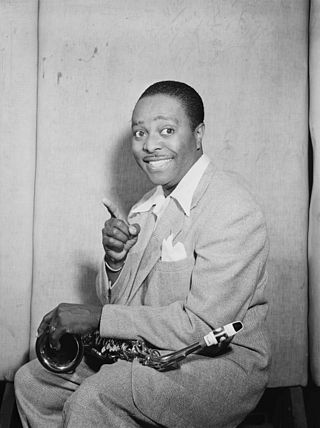
Louis Thomas Jordan was an American saxophonist, multi-instrumentalist, songwriter and bandleader who was popular from the late 1930s to the early 1950s. Known as "the King of the Jukebox", he earned his highest profile towards the end of the swing era. He was inducted into the Rock and Roll Hall of Fame as an "early influence" in 1987.
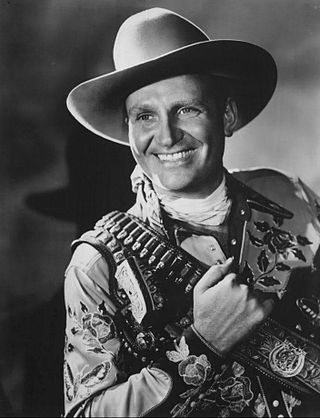
Orvon Grover "Gene" Autry, nicknamed the Singing Cowboy, was an American actor, musician, singer, composer, rodeo performer, and baseball owner, who largely gained fame by singing in a crooning style on radio, in films, and on television for more than three decades, beginning in the early 1930s.
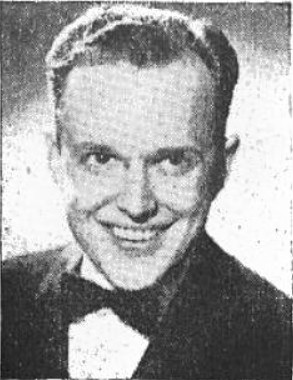
Wilbur Schwichtenberg, known professionally as Will Bradley, was an American trombonist and bandleader during the 1930s and 1940s. He performed swing, dance music, and boogie-woogie songs, many of them written or co-written by Don Raye.
"You Are My Sunshine" is a standard of American old-time country music and one of the official state songs of Louisiana. Though its original writer is disputed, according to the performance rights organisation BMI in 2000, the song had been recorded by over 350 artists and translated into 30 languages.

Lester Alvin Burnett, better known as Smiley Burnette, was an American country music performer and a comedic actor in Western films and on radio and TV, playing sidekick to Gene Autry, Roy Rogers, and other B-movie cowboys. He was also a prolific singer-songwriter who is reported to have played proficiently over 100 musical instruments, sometimes more than one simultaneously. His career, beginning in 1934, spanned four decades, including a regular role on CBS-TV's Petticoat Junction in the 1960s.
This is a list of notable events in country music that took place in the year 1945.
This is a list of notable events in country music that took place in the year 1942.
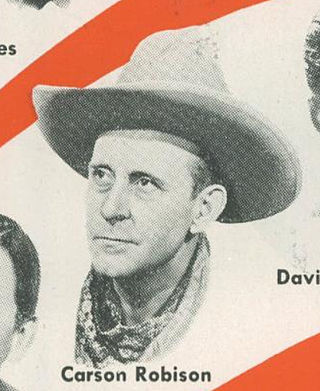
Carson Jay Robison was an American country music singer and songwriter. Although his impact is generally forgotten today, he played a major role in promoting country music in its early years through numerous recordings and radio appearances. He was also known as Charles Robison and sometimes composed under the pseudonym, Carlos B. McAfee.

Let the Good Times Roll: The Music of Louis Jordan is the thirty seventh studio album by B. B. King, released in 1999. It is a tribute album to jazz saxophonist and singer Louis Jordan, and is made up entirely of covers of songs written or performed by Jordan. The album was released in 1999 on MCA Records.
This is a list of notable events in country music that took place in the year 1939.
"Choo Choo Ch'Boogie" is a popular song written by Vaughn Horton, Denver Darling, and Milt Gabler.

Rock 'n Roll Stage Show is the first studio album and fourth overall album by rock and roll band Bill Haley and His Comets. Released by Decca Records in August 1956, it was the group's first album to include new, as opposed to previously released material. Although the album spawned several singles, it also featured several album-only tracks.

James Clarence Wakely was an American actor, songwriter, country music vocalist, and one of the last singing cowboys. During the 1930s, 1940s and 1950s, he released records, appeared in several B-Western movies with most of the major studios, appeared on radio and television and even had his own series of comic books. His duet singles with Margaret Whiting from 1949 until 1951, produced a string of top seven hits, including 1949's number one hit on the US country chart and pop music chart, "Slippin' Around". Wakely owned two music publishing companies in later years, and performed at the Grand Ole Opry until shortly before his death.

All Aboard! is the 27th and final studio album by American singer-songwriter John Denver, released in August 1997. Denver died in a plane crash two months after its release.
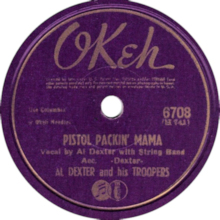
"Pistol Packin' Mama" was a "Hillbilly"-Honky Tonk record released at the height of World War II that became a nationwide sensation, and the first "Country" song to top the Billboard popular music chart. It was written by Al Dexter of Troup, Texas, who recorded it in Los Angeles, California on March 20, 1942, with top session musicians Dick Roberts, Johnny Bond and Dick Reinhart, who all normally worked for Gene Autry). It was used in the 1943 film Pistol Packin' Mama, starring Ruth Terry and Robert Livingston.
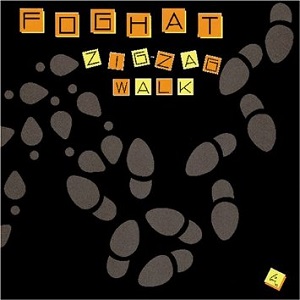
Zig-Zag Walk is the twelfth studio album by British hard rock band Foghat, released in 1983. Unlike the previous year's In the Mood for Something Rude, which consisted of all outside material, lead singer Dave Peverett wrote five of the album's ten songs, with guitarist Erik Cartwright contributing a sixth. A few of the songs are given a rockabilly treatment augmenting the blues rock the band is better known for. It would be the band's last album for over a decade until their comeback album, Return of the Boogie Men, in 1994.
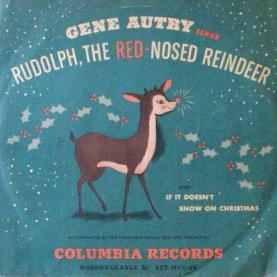
"Rudolph, the Red-Nosed Reindeer" is a song by songwriter Johnny Marks based on the 1939 story Rudolph the Red-Nosed Reindeer published by the Montgomery Ward Company. Gene Autry's recording hit No. 1 on the U.S. charts the week of Christmas 1949.

"Goodbye, Little Darlin', Goodbye" is a 1939 song written by Gene Autry and Johnny Marvin. Autry sang it in the December 1939 movie South of the Border, and released it as a single in April 1940. It went on to make both Popular and Hillbilly (Country) listings for 1940.

"That Chick's Too Young to Fry" is a song written by Tommy Edwards and Jimmy Hilliard. It was performed by Louis Jordan and his Tympany Five, recorded in January 1946, and released on the Decca label. The record's "B" side was "Choo Choo Ch'Boogie".

George Vaughn Horton was an American songwriter and performer. Usually credited as "Vaughn Horton" or "George Vaughn", he wrote or contributed to the success of a number of popular songs, including "Choo Choo Ch'Boogie", "Hillbilly Fever", "Sugar-Foot Rag", "Mockin' Bird Hill" and the Christmas song "Jolly Old Saint Nicholas".
References
- ↑ Cumberland County, Illinois, 1843-1993, Mildred Gentry Lindsay, Shawnee Mission, Kansas: Kes-Print, 1993, p. 103
- ↑ "Radio Artists Entertain Merchants", Titusville Herald, December 11, 1936, p. 2
- ↑ https://collections.carnegiehall.org/Explore/Tag/Chuck-Connors Carnegie Hall page on Clef Awards event
- ↑ https://countrydiscography.blogspot.com/2010/04/denver-darling.html "Denver Darling", April 27, 2010, Praguefrank's Country Music Discographies
- ↑ https://www.cinema.ucla.edu/events/2023/10/06/soudies Listing for "Shy Anne from Old Cheyenne"
- ↑ https://m.imdb.com/title/tt0384863/?ref_=m_tt_urv IMDB listing for "Buffalo Gals"
- ↑ Darling's entry on PragueFrank
- ↑ "Denver Darling", Country Music: A Biographical Dictionary, Richard Carlin, Routledge, 2014, p. 92